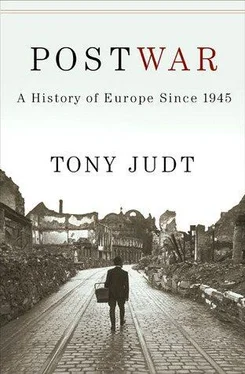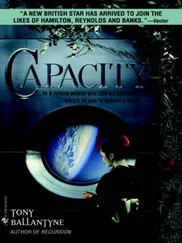From his standpoint, Stalin operated in what passed in Moscow for good faith. He and his colleagues assumed that the Western Allies understood that the Soviets planned to occupy and control ‘their’ half of Europe; and they were willing to treat Western protests at Soviet behaviour in their zone as pro forma , the small change of democratic cant. When it seemed to them that the West was taking its own rhetoric too seriously, demanding freedom and autonomy in Eastern Europe, the Soviet leadership responded with genuine indignation. A note from Molotov in February 1945, commenting upon Western interference over Poland’s future, captures the tone: ‘How governments are being organized in Belgium, France, Greece, etc, we do not know. We have not been asked, although we do not say that we like one or another of these governments. We have not interfered, because it is the Anglo-American zone of military action.’
Everyone expected World War Two to end, like its predecessor, with an all-embracing Peace Treaty, and five separate treaties were indeed signed in Paris in 1946. These settled territorial and other business in Romania, Bulgaria, Hungary, Finland and Italy, though not in Norway, which remained technically in a state of war with Germany until 1951. [30] Italy lost all of its colonies, paid $360 million in reparations to the USSR, Yugoslavia, Greece, Albania and Ethiopia, and ceded the Istrian peninsula to Yugoslavia. The disposition of the border city of Trieste remained in dispute for eight more years.
But however much these developments mattered for the peoples concerned (and in the case of Romania, Bulgaria and Hungary they signaledtheir definitive consignment to Soviet domination), such agreements could be reached because in the end none of the Great Powers were willing to risk confrontation over them.
The business of Germany, however, was starkly different. To the Russians especially, Germany mattered very much indeed. Just as the war had been about Germany, so was the peace, and the spectre of German revanchism haunted Soviet calculations every bit as much as it did those of the French. When Stalin, Truman and Churchill met at Potsdam (from July 17th to August 2nd 1945, with Attlee replacing Churchill following Labour’s victory in the British General Election), it proved possible to reach agreement on the expulsion of Germans from Eastern Europe, the administrative sub-division of Germany for occupation purposes and the goals of ‘democratization’, ‘denazification’ and ‘decartelization’. Beyond this level of general common intention, however, the difficulties began.
Thus it was agreed to treat the German economy as a single unit, but the Soviets were also granted the right to extract and remove goods, services and financial assets from their own zone. They were further accorded 10 percent of reparations from the Western zones in exchange for food and raw materials to be supplied from eastern Germany. But these accords introduced a contradiction, by treating the economic resources of East and West as separate and distinct. Reparations were thus to be a divisive issue from the start (as they had been after the First World War): the Russians (and the French) wanted them, and the Soviet authorities did not hesitate to dismantle and remove German plant and equipment from the outset, with or without the consent of their fellow occupiers.
There was no final agreement on Germany’s new frontiers with Poland and even the common ground of democratization posed practical difficulties in implementation. Accordingly, the Allied leaders agreed to differ and to defer, instructing their Foreign Ministers to meet and continue the talks at a later date. There thus began two years of meetings of the Allied Foreign Ministers—representing the Soviet, American, British and, latterly, French governments: the first gathering took place in London two months after Potsdam, the last in December 1947, again in London. Their goal, in principle, was to draw up definitive arrangements for post-war Germany and prepare Peace Treaties between the Allied Powers and Germany and Austria. It was in the course of these encounters—notably in Moscow during March and April 1947—that the gap separating Soviet and Western approaches to the German problem became clear.
The Anglo-American strategy was driven in part by calculations of political prudence. If the Germans in the Western zone of occupation remained beaten down and impoverished, and were offered no prospect of improvement, then they would sooner or later turn back to Nazism—or else to Communism. In the regions of Germany occupied by American and British military governments, therefore, the emphasis switched quite early to reconstructing civic and political institutions and giving Germans responsibility for their domestic affairs. This offered emerging German politicians considerably more leverage than they could have hoped for when the war ended and they didn’t hesitate to exploit it—intimating that unless matters improved and the occupiers followed their advice, they could not answer for the future political allegiance of the German nation.
Fortunately for the Western allies, Communist occupation policies in Berlin and the Soviet-occupied territory of eastern Germany were not such as to attract disaffected German sentiments and votes. However unpopular the Americans or British or French might be in the eyes of resentful Germans, the alternative was far worse: if Stalin sincerely wanted Germany to remain united, as he instructed German Communists to demand in the initial post-war years, then Soviet tactics were grievously ill-chosen. From the outset, the Soviets established in their zone of occupation a de facto Communist-led government without Allied consent and set about rendering superfluous the Potsdam accords by ruthlessly extracting and dismantling whatever fell within their grasp.
Not that Stalin had much choice. There was never any prospect of the Communists gaining control of the country or even the Soviet zone except by force. In the Berlin city elections on October 20th 1946, Communist candidates came far behind both the Social Democrats and Christian Democrats. With that, Soviet policy perceptibly hardened. But by this time the Western occupiers were running into difficulties of their own. By July 1946 Britain had been forced to import 112,000 tons of wheat and 50,000 tons of potatoes to feed the local population of its zone (the urban and industrial north-west of Germany), paid for out of an American loan.
The British were extracting at most $29 million in reparations from Germany; but the occupation was costing London $80 million a year, leaving the British taxpayer to foot the bill for the difference even as the British government was forced to impose bread rationing at home (an expedient that had been avoided throughout the war). In the opinion of the British Chancellor of the Exchequer, Hugh Dalton, the British were ‘paying reparations to the Germans.’ The Americans were not under the same economic constraints and their zone had not suffered as much war damage, but the situation appeared no less absurd to them—the US Army in particular was not well pleased, since the cost of feeding millions of hungry Germans fell on its own budget. As George Kennan observed: ‘the unconditional surrender of Germany… left us with the sole responsibility for a section of Germany which had never been economically self-supporting in modern times and the capacity of which for self-support had been catastrophically reduced by the circumstances of the war and the German defeat. At the moment we accepted that responsibility we had no program for the rehabilitation of the economy of our zone, preferring to leave all that to later settlement by international agreement.’
Faced with this dilemma, and growing German resentment at the dismantling of plant and installations for shipment east, the US military governor, General Clay, unilaterally suspended deliveries of reparations from the American zone to the Soviet Union (or anywhere else) in May 1946, observing that Soviet authorities had failed to keep their part of the Potsdam arrangements. The British followed suit two months later. This signaled a first parting of the ways, but no more than that. The French, like the USSR, still wanted reparations, and all four Allies were still formally committed to the 1946 ‘Levels-of-Industry’ agreement under which Germany was to be held down to a standard of living no higher than the European average (excluding Britain and the Soviet Union). Moreover the British Cabinet, meeting in May 1946, was still reluctant to accept a formal division of occupied Germany into eastern and western halves, with all the implications that would have for European security.
Читать дальше












